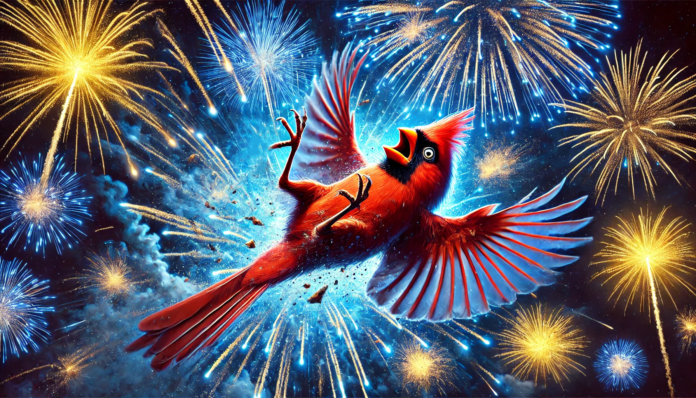Chicago, IL – As Americans prepare to celebrate the Fourth of July with fireworks this evening, it’s essential to acknowledge the significant, often unseen, impacts these displays have on wildlife, particularly birds. Recent studies show that while fireworks are a source of joy for humans, they pose severe threats to bird populations and the environment.
Research by Hermann Stickroth documents the chaotic reactions of 272 bird species to fireworks. Birds, especially those that flock like geese and cranes, react violently to the sudden noise and bright flashes, leading to panic flights, disorientation, and even fatalities. These disturbances cause heightened stress and increased energy expenditure, weakening their overall fitness and survival chances. During breeding seasons, the disruptions are particularly detrimental, often resulting in nest abandonment and the loss of young birds.
Further research by Philip W. Bateman, Lauren N. Gilson, and Penelope Bradshaw, published in Pacific Conservation Biology, highlights both short and long-term environmental impacts of fireworks. The short-term noise and light disturbances cause immediate distress in birds, while the long-term effects include potential population declines due to the timing of fireworks coinciding with migratory or reproductive behaviors.
Additionally, fireworks leave behind chemical residues that pollute soil, water, and air, posing further risks to wildlife and human health. Researchers have found spikes in chemicals including copper, potassium, and chromium in the atmosphere following the holiday due to smoke from fireworks.
Modern alternatives to traditional fireworks, such as eco-friendly fireworks and reusable drone and laser-based light shows, offer safer, less environmentally impacting options. These alternatives provide a sustainable way to maintain cultural traditions without perpetuating the adverse impacts on wildlife and the environment.
As we enjoy tonight’s festivities, it’s crucial to consider their broader implications. By adopting eco-friendly practices and supporting technological alternatives, we can ensure our celebrations do not come at the expense of birds and their habitats. Immediate action is needed to mitigate the harmful effects of fireworks and protect our environment. So if you’re asking yourself now, should fireworks be a thing of the past? According to research, the answer is yes.




